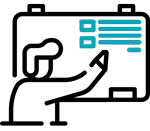Every process relies on people – the specialists responsible for the company’s efficiency. Thanks to our top-notch workshops, training courses, and coaching sessions, our customers are able to unleash the dormant potential of their businesses more efficiently. Our training courses open many doors and our support helps solve existing problems. Our training courses develop employees’ interpersonal and personal skills. It helps to understand the problems that arise from poor communication and improve teamwork, which contributes to increased employee engagement, integration, and ultimately to the success of the company.

From the very beginning, the trainings which we offer are designed and implemented so that they correspond to the realities in your company. Therefore, we always start our cooperation from a thorough understanding of the source of your training needs. After the training is completed, we provide the client with feedback (a report from training evaluation surveys and recommendations for further development actions). The hard training courses we offer make it possible to acquire or strengthen specialist skills necessary for the development of a company.
We assume that a good training is one that strengthens the motivation of employees to change their working methods and standards. Therefore, apart from the training itself, we also offer support in the implementation of new skills, knowledge and standards.

High-quality training

Our own training center

Qualified trainers/practitioners

Training courses tailored to our client’s requirements

Clear and comprehensible training material
Post-training coaching

Participation in training confirmed with a certificate

Choice of training location – outdoors, on the company’s premises, or at invenio’s training center

Modern training methods
Theory and explanation of standardised symbolism. Methodology for measuring and collecting process information always on process (Gemba). Creating a map and how to read it. The 7 types of Muda, where they come from, their risks and costs. How to find muda in processes and how to reduce them.
Genesis and history of Kaizen. Practical benefits of implementation and application in the short and long term. Tools and worksheets and methodology for accounting and cost/profit calculation, motivation and reward.
The direction of the purchasing department and its impact on company costs. Relating Lean to the activities of the purchasing department by presenting the main costs and the main areas of waste. The right definition of the company’s needs: ‘Right The First Time’. Definition of price target, product analysis, manufacturing process, standardisation. Analysis and selection of suppliers. Supplier selection. Discussion of the importance of costing. Theory + workshops.
Presentation of a standard for the visualisation of management by team leaders and managers in their production areas. Presentation of the structure of the functions in the area, responsible for improving safety, sost and loss distribution, workplace organisation.
Origins and application of 5S. Explanation of the differences with the colloquial term 5S: Clean Up Your Mess Yourself. Preparation and implementation of a 5S implementation plan and regular audits to confirm the level of implementation of the plan. KPIs relevant to the plan.
IATF achievement and maintenance principles. Definition of production unit, remote location and extended production unit. Overview of customer requirements against IATF 16949. IATF 16949- requirements of the standard. MAQMSR- discussion of IATF minimum requirements for the automotive supply chain. (Workshop for auditors- as a training option).
To learn about the structure and content of ISO 9001: 2015. To learn about issues/extend knowledge of the organisation’s context, stakeholder needs and expectations. To learn the differences between ISO 9001:2025 vs. ISO 9001:2008. (Auditor workshop- like training option).
Training for internal management system auditors according to ISO 19011 standard. Audit as a management system improvement tool.
Concept of quality. Responsibility for quality. Concept of process. What is a management system. Corrective versus preventive action. ISO 9001 standard.
Introduction to the 8-D methodology. Discussion of a sample 8-D report. (Workshop optional).
Can we reliably identify the cause of a problem? Are we getting to the real cause of problems, or are we sweeping problems under the carpet to temporarily have peace of mind? This training will help you acquire the practical skills to get to the real sources of a production problem by means of analysis and verification methods. The training will allow you to verify your ability to apply what you have learnt by carrying out exercises during the training, as well as an individual project.
Workshop on theory and tools (PDCA, Gemba, F&F-Facts and Figures, 5xWhy), cost analysis, Delphi method, Ishikawa diagram, brainstorming, solution choices matrix, Gantt chart). Explanation of the concept and necessity of Obeya, Jishuken Groupy. Case study on a problem brought by the participants. It teaches analytical thinking, fact finding and systematic problem solving. It sensitises to pitfalls and common mistakes. The result is the preparation of several practical solutions/changes, the benefits of which always exceed the cost of the training.
A key tool for describing and solving problems to be used by any manager, supervisor, engineer or specialist. It teaches how to logically organise and describe tasks and problems. Exercises during training and an individual project.